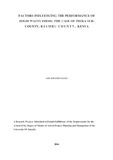| dc.description.abstract | The study is an investigation of the factors that influence performance of Solid waste
firms in Thika Sub-County. Study objectives included establishing how economic factors,
social factors, technical factors and environmental factors influence performance of Solid
Waste Firms in Thika Sub-County. The study did a census of all the thirteen solid waste
firms in Thika Sub-County. In addition, cluster sampling research design was used to
collect views from households in Thika Sub-county. From a total of 92,492 households, a
sample of 156 respondents was chosen. The study combined both primary and secondary
data. Primary data was collected using questionnaires, after which the data was
summarized and categorized according to common themes. Data collected was then
analysed using frequency distribution tables and descriptive statistics was used to describe
the general characteristics of the population. The study found that financial factors namely
financial allocation, service charges and willingness to pay influence performance of solid
waste firms. The study found that there was inadequate financial allocation for
effectiveness of the solid waste firms. The study found that the service charges were low,
yet households were generally unwilling to pay more for services and were instead
demanding utility from the little they were paying. Social factors like the health and social
conditions of the workers, safety and perception of the workers as well as stakeholder
participation influence solid waste firms. Analysis on technical factors showed lack in
areas such as the number of skilled personnel, equipment and vehicles to deal with
collection and disposal. Environmental factors such as use of waste containers,
transportation and disposal procedures as well as awareness on health and environmental
concerns were also identified. The study showed that waste containers and waste
collection points were not adequate in the region. The study findings would be helpful in
policy making and in designing appropriate programs and services for Solid waste
management in Thika Sub-County. The study recommended Economic Empowerment of
Solid Waste Firms operating in the region through the participation of both the
households and the business community through Corporate Social responsibility. The
study also recommended an improvement of the waste collection methods, from use of
concrete containers and dumping waste along the road; to use of closed containers that are
water-tight and environmentally acceptable. The study recommended that further research
needs to be carried out to establish ways of engaging a participatory approach to waste
segregation and sorting prior to proper disposal, as a way of minimizing waste. | en_US |



